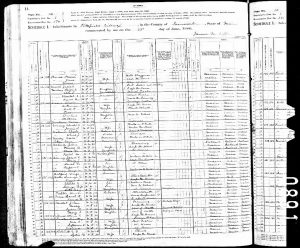Vita Brevis readers may remember from some of my older posts that my husband is an attorney who happens to be blind (he who I have disparaged occasionally with all love and affection). Recently he has been qualified as a candidate for the implantation of the Argus II Retinal Prosthesis System.[1] Once the surgery is completed, he will perhaps be only the fifth person in Boston to receive the implant and certainly the first in Maine. While this extremely new technology will not restore his sight, it will give him the ability to “see” images as patterns of light. I will still be the 20-something blonde I’ve always been (HAH!), but will appear as a glowing configuration of dot matrix lights!
The future has abruptly landed in our lives. I admit that perhaps all too often my brain resides somewhere in my family’s historical past, so I have begun to wonder about the physical disabilities of our ancestors, and how current research will change family history for future researchers. DNA research has already had a major impact on our family histories, solving mysteries, even bringing out more skeletons.
I wondered if any of my own ancestors were blind, what such a disability meant for their quality of life, and how they might have coped.
I knew that Husband has a rare combination of retinitis pigmentosa and non-age-related macular degeneration, but he does not have the specific gene RPE65 relating to retinitis pigmentosa. Short answer: his condition is not inherited from his parents or his other ancestors. Trying to find another blind person in his family would not be productive.
I wondered if any of my own ancestors were blind, what such a disability meant for their quality of life, and how they might have coped. I remembered my mother’s vague memory of a great-uncle who was blind, so I began by using census records to find him.
The first problem I encountered was the wording of the census question about whether the person listed was blind (in both eyes), deaf/dumb, idiotic, insane, or a convict. Frequently those descriptions were lumped together in one question, making any distinction impossible. The 1910 U.S. Census was the last to ask specifically “whether blind (both eyes)” or “whether deaf and dumb,” but nothing about insanity, idiocy, or convicts.
The 1900 U.S. Census did not list the question in any form, but reading carefully I found some individuals listed as “inmates” when their “home” was listed as “asylum.” These census columns did not always list “blind” next to an individual’s name, creating some confusion as to what exactly that person’s disability was: being a convict is not in the strict sense a disability!
His Civil War Draft Registration in June 1863, before his eyesight diminished, lists his occupation as “millman.”
I found that my maternal great-great-great-uncle Eben D. Roberts (1820–1891) had fluid cataracts which blinded him for his last twenty-three years. His Civil War Draft Registration in June 1863, before his eyesight diminished, lists his occupation as “millman.” The 1870 census shows that he was a retired merchant at age 51 (retired because of his failing eyesight?), but by the 1880 census, he was listed simply as “blind” at age 60.
Eben apparently had a successful work life, if shorter than it might have been otherwise, but without the family support of wife (she died before him) or children (he had none). He lived at his home with his niece until her marriage. He died “at home” in Corinna, Maine, avoiding the fate of many blind people: loss of independence and, perhaps, placement in an asylum.
The disabled have never been treated gently, from the Spartans’ view of infirmities to individuals holding signs on streets seeking alms or food. In fact, the word “handicap” comes from “hand-in-cap” (honest! I did not just make that up!), a hat being the predecessor of the ubiquitous tin cup. That was yesterday. Today, while discrimination exists in many areas, we no longer leave blind infants to die on mountainsides, although one former neighbor told me I should sit Husband in a lawn chair with a drool bib if he couldn’t “really help me.”
With apologies to Fleetwood Mac, yesterday’s gone, don’t stop thinking about tomorrow because it’s already here.
Note
[1] http://www.secondsight.com/g-the-argus-ii-prosthesis-system-pf-en.html.
Share this:

About Jan Doerr
Jan Doerr received a B.A. degree in Sociology/Secondary Education from the University of New Hampshire, and spent a long career in the legal profession while researching her family history. She has recently written and published articles for WBUR.org’s Cognoscenti blog: “Labor of Love: Preserving a 226-Year-Old Family Home and Preparing to Let It Go” and “The Value of Family Heirlooms in a Digital Age.” Jan currently lives with her attorney husband in Augusta, Maine, where she serves two Siamese cats and spends all her retirement money propping up a really old house.View all posts by Jan Doerr →
